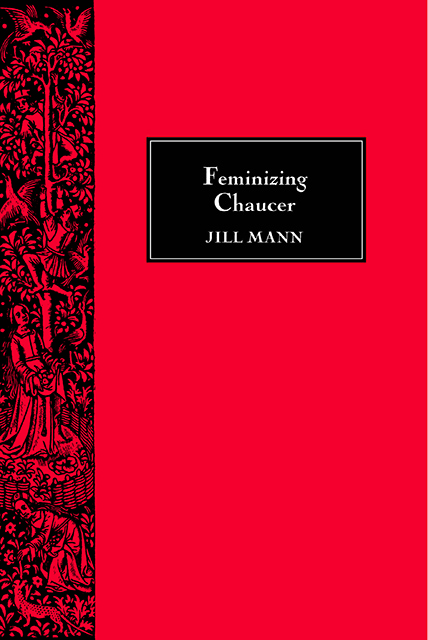Book contents
- Frontmatter
- Contents
- Dedication
- Preface to the 2002 Edition
- Preface
- Abbreviations
- Introduction
- 1 Women and Betrayal
- 2 Antifeminism
- 3 The Surrender of Maistrye
- 4 Suffering Woman, Suffering God
- 5 The Feminized Hero
- Conclusion
- Excursus: Wife-Swapping in Medieval Literature
- Chaucer Studies
- Bibliography
- Index
- Frontmatter
- Contents
- Dedication
- Preface to the 2002 Edition
- Preface
- Abbreviations
- Introduction
- 1 Women and Betrayal
- 2 Antifeminism
- 3 The Surrender of Maistrye
- 4 Suffering Woman, Suffering God
- 5 The Feminized Hero
- Conclusion
- Excursus: Wife-Swapping in Medieval Literature
- Chaucer Studies
- Bibliography
- Index
Summary
Chaucer is a major poet and women are a major subject of his poetry. In consequence, this book has turned out to be much longer than it should have been, and even so the reader will notice some obvious omissions. Among the more important casualties are the Prioress and her tale, St Cecilia, the Wife of Bath's fourth husband, the Book of The Duchess and the Parliament of Fowls. I can only plead in excuse that it seemed less important to give exactly equal coverage to all things female in Chaucer's work than to develop a coherent argument which would enable the reader to place individual works or passages in relation to a structure of poetic thought and practice.
The restrictions of space have had other consequences: I have had to omit any systematic survey of previous feminist writings on Chaucer, although I have dealt with numerous examples of them at appropriate points of my own discussion. I have also had to renounce any attempt to define the relationship between the fictional world of Chaucer's poetry and the social realities of fourteenthcentury England. I hope that in doing so I shall not be thought to believe that when all is well in literature, all is well in life, but I do believe that literature is not only produced but also produces – that it is precisely in its imaginative engagement with the ideologies and myths of contemporary society that it can make a contribution to the formation of new social conditions. To concentrate on the text is therefore not an isolationist exercise, but a recognition that this imaginative engagement is itself a critique of prevailing ideologies and a visionary outline of the future, which must be grasped in its full subtlety if it is to be of any use.
As for the kind of ‘feminist reading’ that this book represents, I should make it clear that it is not tied to any particular school of feminist criticism, though I have formed many of my arguments in mental dialogue with their imagined representatives.
- Type
- Chapter
- Information
- Feminizing Chaucer , pp. xx - xxiPublisher: Boydell & BrewerPrint publication year: 2002

